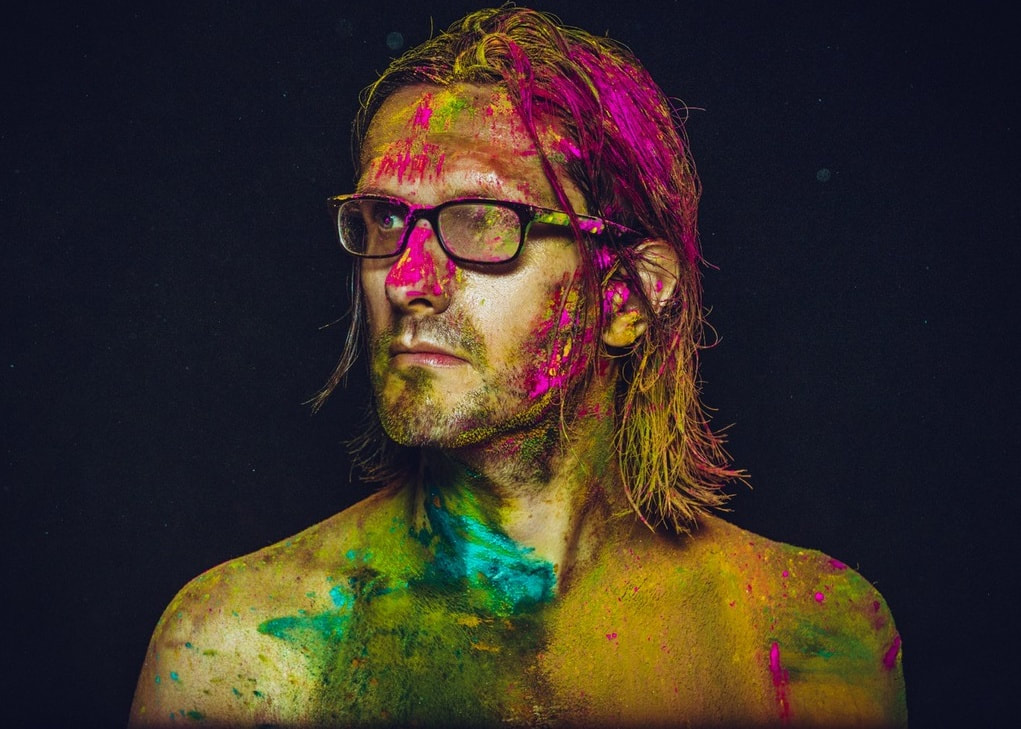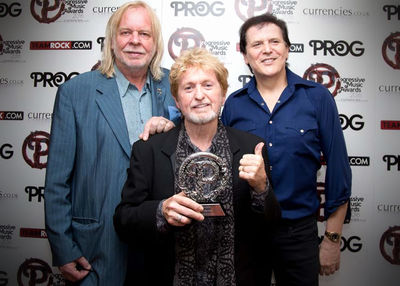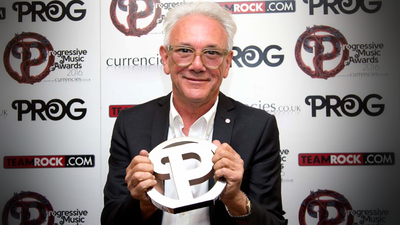|
Steven Wilson is a genuine musical polymath. The UK’s biggest underground artist, the former Porcupine Tree founder has worked with such luminaries as Rush, Tears For Fears and Marillion, has held down a successful solo career, and is a regular at the Royal Albert Hall, selling out the prestigious London venue on repeated occasions. About to hit the road in support of No. 3 album ‘To The Bone’, the most successful British artist you’ve never heard of is due in the UK and Ireland in March, for a run that includes his first ever shows in Belfast and Dublin. We sat down with Steven for an in depth chat about the shows, his career, and his ambitions. The same asylum as before; Eamon O’Neill.
Hi Steven, how are you today?
I’m keeping myself warm because I’m actually in Bergen in Norway. We’ve just come from Stockholm and Oslo and Helsinki, and you think it’s cold over there? Imagine what it’s like up here! It’s freezing cold, so I’m keeping myself well wrapped up and inside. Does the cold play havoc with your fingers? Well, I went for a walk in Helsinki a few days ago, and I thought; “I’ll be okay, I’ll wrap up warm”, and I came back and it was like my whole head was aching. It was like a headache I couldn’t get rid of for about twenty-four hours. So, it’s a different kind of cold, that’s for sure. It was hard to get through the show that night, I’ll tell you, because it’s hard to play and concentrate when your whole head is throbbing from the cold. This tour sees you play your first ever gigs in Ireland; you’ve been wanting to come to Ireland for a while, haven’t you? Yeah, it’s been the one place - well not the only place - but the one obvious place I think that I’ve not yet been with my band. It almost feels like starting from the beginning in Ireland, although that’s not entirely true because I do have people over that that have been listening to my music. But it’ll be nice to give people an idea of what I’ve been doing with the live show over the last few years, which is very ambitious. How has your live show developed over the years? It’s quite a spectacular show, and I think one of the things that’s enabled me to grow in terms of having a following, is people have come to the shows, they’ve really enjoyed what they’ve seen, and they come back the next time and they bring three of their friends. That’s how you build an audience for a live show; you blow people away, and they come back two years later, and that’s how it’s worked for me everywhere else. So, I feel like I’m kind of starting a little bit behind in Ireland, but I’m really happy, finallym to be able to bring the show, and maybe to start to get people talking about the show. When you play in a new country, or at a new venue for the first time, does it bring with it a sense of trepidation? Well, you never know how many people are going to show up the first time. Ireland is, like I say, almost like going back to square one, but you know, however many people show up, I trust to the fact that they will go away, hopefully, having seen one of the best shows they’ve seen all year, and if that isn’t the case, then I’ve done something wrong. But I think it is one of the best shows people will see all year, if they come along. You’re playing at the Mandela Hall, which is one of Belfast’s most historic venues. I’ve been very lucky to play at some legendary venues, and it’s always a thrill. A lot of these venues when you go backstage, they have almost a museum of people who have played there over the years. If you’re backstage at the Olympia in Paris, or at the Royal Albert Hall in London, for example, you can see this incredible heritage of artists, and it is quite daunting. But it’s also thrilling - of course it is – it’s amazing to step out on the same stage that these great icons have performed on in the past. You’re touring in support of ‘To The Bone’ which has been a huge success; were you surprised by how well the album was received?
I guess I was. I worked very hard to promote the record, and I think there is a sense that there has been a growing interest in my albums; each album’s done a little bit better than the previous one. There was a lot of anticipation around this record, but even so, I certainly didn’t expect the level of success that it had. I think it was No.3 in the U.K. in the end, and it hung on to the No.1 spot literally, until the last day of the chart week. Everyone was eagerly looking every day; “Oh, Ed Sheeran’s catching us up!”, all this sort of thing. In the end, I think Ed Sheeran pipped us, and a compilation by Elvis, but in Germany it was No.2, and in Finland it was No.1, I mean, it was amazing! You’ve been quite vocal about the mainstream’s resistance to support rock music. I don’t wish to poor cold water on my own success, but one of the things I think is more important these days is to have some kind of sustained sales. I think what we’re seeing a lot these days is, a lot of these rock bands, people like myself, who have massive followings, we do have fantastic week one sales, and then week two, week three, we kind of fade away, and then by week four we’ve disappeared. I think that the frustration there is when we look at some more mainstream pop artists; people like Ed Sheeran sell week in, week out, every week, they’re always there, and I think what’s a shame is that there isn’t more support from the mainstream for rock music these days. It’s almost invisible in the mainstream. So I feel like I’m one of those people that’s trying to perhaps fight against that a little bit, and I did do as much mainstream publicity as I could. I went on BBC breakfast TV, and I was in The Sun talking about these things. It’s a shame to me that rock music these days, it feels like it’s a little bit marginalised by urban music, and mainstream pop music. Whether willingly, or not, Steven Wilson does seem to have been almost bestowed the title of ‘Gatekeeper of Prog Music’. It’s obviously something that you take seriously. Well, yes and no; I don’t really think of myself as a generic artist. I mean, people use the word ‘Prog’ a lot with regards to me, and I never use it with regards to myself. I don’t really think of myself as a generic artist. ‘To The Bone’ is a classic case in point, because it has a lot of different kinds of music on it. It has pure pop on it; there is one song on there particularly, which is called ‘Permanating’, which very much comes from my memories of growing up listening to my mum’s Abba records and things like that. It’s a pure piece of joyous pop, and as far as I can tell, and it has nothing to do with the world of prog. So I think I’ve always been fairly ambivalent about that. I think other people have made me, to use your word, the kind of ‘Gatekeeper’ of modern prog music. Maybe that’s why I’ve been put into that position; because I haven’t really contrived to get myself into that position, if you know what I mean. Maybe that’s exactly want a truly progressive musician would be like. I think a truly progressive musician doesn’t stand up and say; “Hey, I play progressive rock”; as soon as you do that, you’re almost creating a set of parameters and limitations within which you work, and of course, that, in many ways, is the antitheses of being progressive, and of having a progressive spirit. So, if I’m kind of intellectualising this, maybe that’s why people have kind of chosen me as this kind of guy, because I’ve never really tried to be progressive or said I was progressive. Maybe that’s indeed what makes me progressive, I don’t know. Coming full circle, the likes of Alex Lifeson has said he’s a fan of your work, and you’ve done some remix work for Rush.
It’s amazing. I’ve known Alex for a long time. I wouldn’t go as far as to call him a close friend - I wouldn’t flatter myself with that - but I’ve known him for a long time, and he’s a lovely chap. Rush are at a point in their career now where they’ve effectively ceased to exist as a band, and so I guess, for the first time they’re really beginning to look back, and thinking about curating their back catalogue, rather than thinking about their next project. So, I was very happy to be invited to get involved in that process. I know a lot of those albums very well, so I feel like I can bring the perspective of a fan to those records, which is kind of what you want; if you’re going to work on a classic, almost like on a sacred text, and as a fan, you want to know the person who’s working on it has that same kind of reverence for it that you do. And I do, and I bring that kind of reverence to those kind of projects. But those guys are a joy to work with, and as you say, it’s almost kind of full circle for me, because a lot of that music is in my very musical DNA. You’ve worked on a lot of other iconic albums over the years. These jobs are quite hard work. There is a thrill of course in being able to delve into the music, but they’re also quite intense, and I want to do the right thing by the fans and by the artist. If I’ve done a project, you can pretty much assume I’ve enjoyed it, with a couple of exceptions early on in my mixing career, because I don’t take on things unless I can genuinely say; “I love this album, and I know this album very well”. And that’s been true of everything I’ve done. More recently I’ve done things like Tears For Fears, Roxy Music, XTC, Jethro Tull; all of these bands are bands that I can honestly say that I grew up with their music. Any record that I do, whether it’s ‘Misplaced Childhood’, or ‘A Farewell To Kings’ or ‘Songs From The Big Chair’; they’re all albums that I know like the back of my hand. So, I feel like I’m the right person to be doing them, in that sense. Is there any artist that you haven’t worked with, either musically, or in the remixing capacity that you’d like to? Well, top of my list is Kate Bush, and she’s been top of my list for a long time. I’ve said it in interviews many times, and I’ve approached Kate a few times through her manager, through mutual friends, through her engineer, and for whatever reason, just because she’s Kate Bush and she does her own thing, she doesn’t seem interested at the moment in her catalogue being remixed. Me, personally, I think it’s a shame because, even if it wasn’t me doing it, I think her music is just perfect for surround sound. She’s really top of my list, but, Pink Floyd, of course would be amazing to do, Zappa would be amazing to do, Stevie Wonder’s catalogue would be amazing to do in surround sound; there are many others. But if I had to pick just one catalogue, it would be Kate’s. Back to the tour, and you’re playing three nights at the Royal Albert Hall; you must be excited to return there. Yeah, not only because it’s incredibly prestigious, but actually, it’s one of my favourite venues to play. Even if it wasn’t as well known and as famous and prestigious as it was, it just feels great to be in that room. There’s something about the layout; the way the audience are almost wrapped around you, the acoustics; everything just makes it such a joy to play there. If I had to pick one thing that was the most important signifier of where I’ve come from over the last five or six years, it’s this progression of going from playing Shepherd’s Bush Empire, to playing one night at the Albert Hall, to playing two nights at the Albert Hall, and now to be playing three nights at the Albert Hall. That, to me, is the way, in a sense, how I measure how things have gone for me as a solo artist. It’s amazing, absolutely amazing. Looking forward, when do you expect to get back in the studio to work on the next album? Well, I’m already writing. I had a few months off between the release of the album, and the beginning of the tour, so I started writing some new ideas. I’ve got a few ideas already, but I don’t expect I’ll be doing much this year except being on tour. It’s hard to work and write on tour, and the tour already extends to October, and I think it’s probably going to even go through until the beginning of 2019. So, I don’t imagine I’ll get back to the studio properly until mid-2019. So, it’ll be a while yet, but you know what, there’s still a lot of music that I’ve got in my back catalogue that needs to be played first on the road, so I’m happy to be doing that for now. Finally, there’s a hard core following of you fans who would never forgive us if we didn’t ask; what are the chances of a return for Porcupine Tree? Well, honestly, I would say zero, because I’m just not that kind of person. I don’t go backwards. I’m not interested in going backwards; I want to move forwards, I want to do different things, I want to work with different people, I want to explore different kinds of music. That would seem like a terribly backward step to me. I’m proud of the catalogue; it’s there, it exists, but it’s kind of closed, it’s finished. We did ten albums in fifteen years; I think that was a good time to stop and do something else, personally. Steven Wilson plays Belfast’s Mandela Hall on 17th March, and Dublin’s Olympia Theatre on 19th March. For tickets, click HERE. Like this interview? Like us on Facebook and follow us on Twitter for regular updates & more of the same. Steven Wilson 2017 U.K. and Ireland Dates: Sat 17 Mar - Belfast Mandela Hall Mon 19 Mar - Dublin Olympia Theatre Wed 21 Mar - Cardiff St David’s Hall Thu 22 Mar - Birmingham Symphony Hall Sat 24 Mar - Glasgow Clyde Auditorium Sun 25 Mar - Gateshead Sage 1 Tue 27 Mar - London Royal Albert Hall Sat 31 Mar - Manchester Bridgewater Hall |
|
Steven Wilson.
"I’ve never really tried to be progressive, or said I was progressive; maybe that’s indeed what makes me progressive, I don’t know."
© 2016 - 2024 eonmusic.co.ukContact: [email protected]
|




